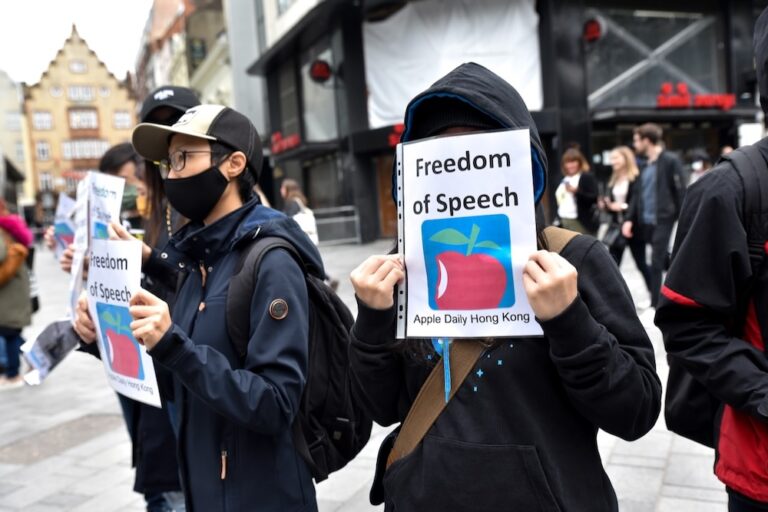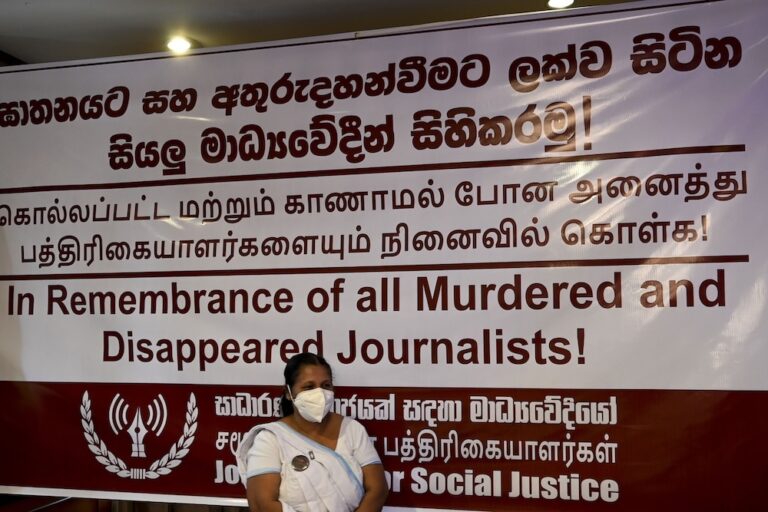(IAPA/IFEX) – The following is an IAPA press release: World Press Freedom Day Message Rafael Molina, El Día, Santo Domingo, Dominican Republic President of the Inter American Press Association Journalists and news media in the Americas continue facing major obstacles in seeking to do their job. Organized crime and corruption continue to be sources of […]
(IAPA/IFEX) – The following is an IAPA press release:
World Press Freedom Day Message
Rafael Molina, El Día, Santo Domingo, Dominican Republic
President of the Inter American Press Association
Journalists and news media in the Americas continue facing major obstacles in seeking to do their job. Organized crime and corruption continue to be sources of violence that curtail the public’s right to information. In the 12 months since the last commemoration of World Press Freedom Day, 15 journalists have been murdered – eight in Mexico, one in Peru, one in Haiti, one in Guatemala, two in Venezuela and two in Colombia – while three others are still missing in Mexico. In addition, death threats against journalists are constantly being reported in Brazil, Colombia, Dominican Republic, Ecuador, Guatemala, Honduras, Paraguay, Peru, Uruguay and Venezuela.
Meanwhile, the poor response of governments, particularly in Cuba and Venezuela, with regard to lack of guarantees for people to be able to exercise their right to receive and seek information, as well as constant attacks upon the press, are keeping our organization on the alert.
Cuba has the dubious honor of being the biggest prison in the Americas. A total of 29 journalists are behind bars there, in some cases serving prison terms as long as 27 years, and in recent months there has been a resurgence of harassment of the independent press and the foreign press, stifling the free movement of reporters. Three foreign correspondents had to leave the country when their permits to remain there were not renewed, while independent Cuban colleagues of theirs have been refused permission to leave.
In Venezuela, President Hugo Chávez, wielding increasingly absolute power that has no legal or technical justification, insists on not renewing the broadcast license of Radio Caracas Television (RCTV), for the sole reason that he is annoyed by its criticism of him. Other media have been fined, threatened with having to pay higher taxes, discriminated against in carrying out their reporting role, and denied their access to news sources, and the placement of official advertising has been used as a means of punishment or reward. Government officials make no bones about their view that the best nation is one where the news media adopt a submissive editorial policy.
Friction between the press and government is natural in a democracy, as society gives the media the duty to be a watchdog over public affairs. One views with alarm, however, how numerous governments arbitrarily employ certain prerogatives and privileges to weaken the credibility and work of media and individual journalists, as constantly happens in countries where those in power vehemently berate the news media and journalists when they are uncomfortable with reports on their activities (Argentina, Bolivia, Ecuador, Honduras, Nicaragua, Uruguay), public demonstrations in which reporters and media are not free from danger are staged (Bolivia, Cuba, Ecuador, Venezuela), or they are discriminated against, or are threatened with discrimination, in the placement of official advertising as if it were the private property of officials and did not belong to the public (Argentina, Aruba, Ecuador, Guyana, Uruguay, Venezuela).
Strained relations between the judiciary and the press also take on a particular importance. In Brazil, Colombia and Paraguay court orders regularly call for prior censorship or impose outrageously high damages awards which have the effect of restricting or halting investigative reporting, or which even put at risk the ability of the media to continue operating, or encourage them to resort to self-censorship. In Panama, for example, where 33 journalists are being put on trial and could end up facing substantial fines or imprisonment, there is no doubt that self-censorship may well be weakening the press. In the United States, a country whose government traditionally respects ample freedom of expression, we see how numerous reporters continue being sent to jail for defending the confidentiality of their sources.
While all this may be a dreary panorama, we cannot fail to point out a profound change that is emerging in the Americas. Governments are doing much better at interpreting the principles that govern free speech. In recent years a number of countries have enacted laws on access to public information, which, while they do not have a direct impact or one that can be measured at this time, certainly will be relevant in the future in creating stronger and more solid democracies in which any member of the public can monitor and be aware of what his or her officials are doing.
Without a doubt the best news concerning freedom of expression that a society could have had so far this year is the enactment of a law in Mexico that decriminalizes libel and defamation, enabling citizens not to have to fear being sent to prison when they utter criticism or opinions. Mexico thus has joined El Salvador in this regard, and in the IAPA we trust that other nations will follow suit and adopt this philosophy in fostering a more just and democratic society.
World Press Freedom Day, which is celebrated each May 3, was declared in commemoration of the Declaration of Windhoek, a document containing principles on the defense of freedom of the press, drawn up in 1991 during a meeting of African journalists sponsored by the United Nations Educational, Scientific and Cultural Organization (UNESCO).


